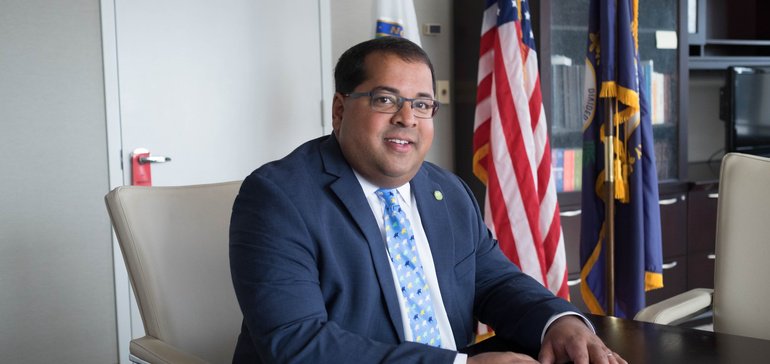FERC Chairman Details Interim Plan to Save Coal, Nuclear Plants

By Gavin Bade
November 16, 2017 - The acting chairman of the Federal Energy Regulatory Commission is considering regulatory language that would direct regional grid operators to update their market tariffs to keep at-risk coal and nuclear generators online while FERC further considers a cost recovery proposal for baseload generation from the Department of Energy.
FERC Chairman Neil Chatterjee told Utility Dive the commission could issue a "show cause" order directing RTOs and ISOs to update their tariffs to keep plants online that provide "necessary resilience attributes," or show why they should not be required to do so. FERC would then issue a longer term rulemaking to address broader issues of resilience and market compensation.
Chatterjee warned the interim solution would be "messy" and "uncomfortable," saying he wants to "link" the interim step with a broader resilience rule to "accelerate" its finalization. The acting chairman said he has not discussed the proposal in detail with any other sitting or pending FERC regulator.
Last week, Chatterjee revealed to reporters that he is considering an interim step to keep at-risk coal and nuclear generators online while FERC considers the DOE's controversial Notice of Proposed Rulemaking (NOPR).
On Wednesday, Chatterjee provided further detail of those plans in an interview with Utility Dive, outlining language of a potential "show cause" order under Section 206 of the Federal Power Act.
The order would require each regional grid operator to provide "interim compensation for existing resources that may provide necessary resilience attributes and are at risk of retirement before the conclusion of the longer-term rulemaking proceeding," Chatterjee said, or "show cause that it not be required to do so."
FERC would justify its actions with statements from the North American Electric Reliability Corporation and others asserting that "reliable and resilient operation of the bulk power system requires a balanced portfolio of diverse resources," Chatterjee said. It would also cite precedents where FERC "has recognized that at times market revenues alone may not prevent the retirement of resources necessary for reliability purposes."
To prevent the retirement of critical power plants in the past, FERC has directed "the creation of and approved different forms of reliability-must-run provisions in the RTO and ISO tariffs," Chatterjee said, reading from draft language. "The commission has also approved out-of-market compensation mechanisms to mitigate specific reliability risks deemed to be unaddressed by the existing market structure."
With interim compensation mechanisms in place, Chatterjee said FERC could issue a longer term rulemaking that would explore whether grid operators should be required to plan for "correlated risk outages," and how they could be directed to "compensate resources for resilience attributes."
Regional grid operators already have sophisticated planning procedures to ensure reliable power generation, but Chatterjee said he thinks they may need to go further to plan that correlated factor — multiple, simultaneous threats to the grid.
"The way that we plan for grid outages now, we don't do correlated risk — looking at ... what happens if you have multiple generators going in the region and you have a cascading effect?" he said. "What happens in the event of a manmade disaster or natural disaster, a physical attack or cyber attack on an infrastructure that takes out large chunks of [the grid]?"
As part of the broader rulemaking, Chatterjee said FERC would explore whether resilience attributes unique to coal and nuclear plants are due to their ability to store fuel onsite.
"Are there attributes there that in a security event, in a resilience bounceback situation, do they provide value that they aren't currently being compensated for, and is that unjust and unreasonable?" Chatterjee said. "That is the question we have to look at."
That discussion is likely to be a lengthy one, Chatterjee warned, and in the interim he wants to ensure that fuel-secure plants struggling in wholesale power markets today do not go offline before the broader rulemaking is complete.
"Maybe we will conclude there's no imminent threat to resilience and that these other baseload assets were not necessary from a security and resilience correlated risk standpoint," Chatterjee said. "But what if we're wrong and we find out that we did need them and they're gone? The risk of that is, I think, in the ratepayers' interest [to address] and is a cost worth paying. And I think ratepayers have paid for things that have a lot less grid value than that."
Chatterjee said he hopes to work with grid operators to ensure the interim support package is "as minimally distortive to markets as possible." That could be achieved through a mechanism that directs plants to bid their unsubsidized marginal costs into energy markets, excluding any resilience payments or other subsidies.
"We would have to find some way to ensure and enforce that they in fact bid in their marginal costs and therefore it did not alter dispatch and it did not change market behaviors," Chatterjee said, "so that they could not account for the resilience payments as they bid in their marginal costs."
That plan aligns with a basic tenet of traditional cost-of-service utility regulation — namely that plants are provided cost recovery regardless of whether they are dispatched. But Chatterjee stressed that he is not pushing for FERC to return restructured states to the cost-of-service paradigm.
"I believe in markets and I believe in competition," Chatterjee said. "I believe in making sure that these markets work for the long term but that also we do this analysis to ensure that resilience ... and security are insured for the long run."
Chatterjee's interim plan also shares some critical similarities with comments filed at FERC by coal generator FirstEnergy. The company advocated a temporary compensation package in which any plant designated as "resilient" by regional grid operators would receive "a payment each month equal to its full costs of operation and service," minus the plan's market revenues.
The targeted nature of the DOE NOPR — which largely applies to coal and nuclear generators in the PJM market — has led many observers, including former FERC regulators, to conclude the DOE proposal is a "favor" to Trump campaign supporters like FirstEnergy. Chatterjee said last week that he met with the company's senior executives to discuss their plan, but rejected the notion that his interim proposal is "somehow tied to one company or one entity or political donors to the president."
"The reason I wanted to meet with the FirstEnergy team is that amongst the comments that were submitted they were one of the ones that actually put forward a potential solution," Chatterjee said. "I wanted to have our experts here really put them through their paces ... to test the concepts that they put forth. In no way did I come out of that meeting saying 'well FirstEnergy says they're desperate, and so we need to do this thing.' I've been thinking about these issues long before that meeting."
FirstEnergy is currently trying to sell off more than a dozen midwest power plants, mostly coal and nuclear units that have struggled to compete against cheap natural gas-fired power. Those assets would likely be more lucrative if FERC enacted an interim cost support package, but Chatterjee said the issue did not come up in his meetings with the company.
"I am unaware of that and I can't speak to the business decisions they make," Chatterjee said. "The specifics of what plants and who they're looking to, that's the first I've become aware of it."
Chatterjee said he still expects FERC to act on the NOPR by Dec. 11, the date requested by DOE. He said he has not spoken about the idea with either of the two pending FERC regulators — energy lawyer Kevin McIntyre and Senate staffer Richard Glick — who could be sworn in as early as next week.
The two other sitting commissioners — Robert Powelson and Cheryl Lafleur — have both expressed reservations with the NOPR, worried that putting a significant number of generators under cost recovery could unravel wholesale markets. Chatterjee said he hopes his interim proposal will persuade them that they can have both coal and nuclear subsidies and functioning power markets.
"Working with the staff, we've certainly gotten input from my colleagues as we've gone through this process," he said. "I'm hopeful that once I'm able to really flesh out this interim construct and longer term rulemaking then I will be able to persuade my colleagues that this is the right thing to do."

Neil Chaterjee

